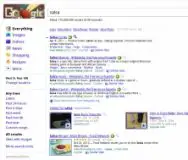Many of us use Google search many times a day to find, scour and research anything and everything under the sun many a times a day. Here are a few easy tips to improve on those search queries without having to learn and remember any of the complex search syntax…
1) Fill in the blank with an asterisk (*)
Using an asterisk (*) in your query will match all possible words that occur at that location in your query. You can use it to find answers to questions. An example would be [* won the 1924 world series] or [lincoln got * votes in 1860] which should show you who won the world series in 1924 and how many votes Abraham Lincoln got in the 1860 elections. You can also use * as a placeholder to match multiple words in a query, such as [tips and * on using computers] which will match words such as “tips and tricks” or “tips and hints”.
2) Exclude words using a hyphen (-)
Sometimes depending on the the search terms you might want to exclude some words or set of results from showing up. Try searching for [cougars in washington state], you might end up with all the news and information about the Washington State University teams. To find any information about the “actual cougars”, you can try [cougars in Washington state -football -university -sports] or something similar to that. Same goes for some queries for salsa , try [salsa -dance].
It allows you to get more relevant results on your front page. It may also allow you to remove any embarrassing results that might show up.
3) Use OR
If you want to search for either of words but not all of them, you might want to use the OR (in caps). The query [San Francisco Giants 2010 OR 1954 OR 1933] will return you results from either 2010 or 1954 or 1933. Searching for [San Francisco Giants 2010 1954 1933] will actually give preference to any results which mentions all three years.
Additional Tip: Google uses synonyms by default when performing searches. If you would like to restrict the uses of synonyms for a particular word in the query use plus (+) in front of the word. If you like to see only results for [favorite book] and not all the favorite books, then you will use [+favorite +book].

